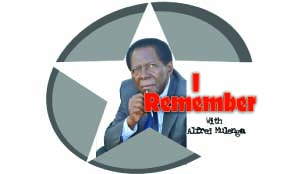 THE World Cup finals kicked off last Thursday with hosts Brazil beating Croatia 3-1 in the opening match played in Sao Paulo and thus set the tone for the tournament at which Africa is represented by five countries.
THE World Cup finals kicked off last Thursday with hosts Brazil beating Croatia 3-1 in the opening match played in Sao Paulo and thus set the tone for the tournament at which Africa is represented by five countries.
If you asked me, I would say the fact that none of the five nations featuring at the World Cup is from Southern Africa is a sign that our region has to do invest more resources into the development of football if we are to catch up and even surpass our North and West African counterparts.
At the individual level, players and officials, including referees have serious challenge. They simply have up their game.
There should be no half measures, otherwise Zambia, and other Southern African Development Community (SADC) countries, will continue to be shooting practice for West and African nations when it comes to competing for the five World Cup berths that FIFA, the world football governing body, has allocated to our vast continent.
Currently, four of the countries representing Africa at Brazil 2014 World Cup tournament are West African. These are: Cameroon, Ivory Coast, Ghana, and Nigeria. Algeria (fifth) is the North African torchbearer.
Is it not a shame that after 50 years of independence Zambia has been unable to reach the World Cup finals despite having one of the best organised soccer leagues in Africa – the National Football League (NFL) with world class players like top marksman Godfrey ‘Ucar’ Chitalu?
Formerly of Kitwe United, Chitalu later joined Kabwe Warriors and scored a total of 107 goals (in league, cup, and Zambia international matches in a single season), a world record that remains unbeaten.
We also had a vibrant Zambia Secondary Schools Football Association (ZSSFA) league spearheaded by British expatriate teachers like Glen Peters of Kabwe.
The Zambia Schools XI acted as a nursery for the Zambian national team in mid-1960s and early 80s, producing countless stars such as Richard Stephenson, Peter Mhango, Boniface Simutowe, Bernard ‘Bomber’ Chanda, Dennis Lota, Abraham ‘Gordon Banks’ Nkole, Edward Nkole, Willie Kunda, Ackim Musenge, Kalushya Bwalya, Kenny Mwape, Patrick Nkhata, Joseph Mapulanga, Emmanuel Mwape, Moses Simwala, Kaizer Kalambo, Edward Musonda, Sandford Mvula, Gerick Lundwe, Poni Muyambango, Reggie Phiri, Gibby Zulu, Charles Musonda, Brines Mulenga and Johnston Bwalya.
Under the aegis of the Thom Mtine-led Football Association of Zambia (FAZ), the Zambia Schools FA had clinched a special arrangement under which English youths from leading English Football Association (FA) sides from the United Kingdom (UK) came to Zambia annually for a series of games against the Zambia Schools XI.
The UK youth sides that came on such tours included West Ham United, Wolverhampton Wanderers, Aston Villa, Ipswich Town, and Leicester City.
Their matches were exceedingly popular and always drew huge crowds both on the Copperbelt and in the Midlands where Woodlands Stadium was often the preferred venue.
And just a few years after gaining independence in 1964, Zambia broke new ground in the world of football when Freddie Mwila, then of Rhokana United (Nkana), Emment Kapengwe of Kitwe United and Howard Mwikuta of Broken Hill Warriors (now Kabwe Warriors) left the country to play for Atlanta Chiefs of the newly launched United States of America Soccer League.
The three highly gifted were recruited by American Soccer League agent Phil Woosnam and were joined by two other players both from South Africa in Kaizer Montaung (the owner of the popular Kaizer Chiefs) and Jomo Sono, who also owns another South African Football Association side, Jomo Cosmos.
So Zambia has no excuse for failing to qualify for the World Cup finals where the relatively newcomers United States of America have now become a regular feature.
Angola, Democratic Republic of the Congo (DRC) and South Africa have also made it to the finals at our expense. What is the problem?
As for Africa’s representatives at Brazil 2014 finals, I would rather put my money on Ghana’s Black Stars purely on the basis of their past performance.
The Supper Eagles seem to have assembled a strong side, but like in 1994 when they last played across the Atlantic Ocean – and when expectations were very high – the Nigerians may not soar like the eagle once more. Certainly Coach Stephen Keshi has a daunting task.
On paper, Ivory Coast should do better as they have a very strong squad, led by captain Didier Drogba. But like traditional World Cup under performers of Europe Holland (The Netherlands), the Ivorians, despite boasting a host of top players who ply their trade in Europe, are only there to fulfill their fixtures; so are Cameroonians and Algerians.






